Sensationalism sells, and people who would like you to call them “journalists” use it to their advantage.
I was looking at an interesting Wikipedia list of people who have predicted the end of the Earth. Some of the entries are a bit comical – although this was serious business for those making the predictions. As they came and passed, it has been common for the prognosticators to simply pick a different day further in the future. What would you do if you made such an error? Here are a few possibilities:
- Own up to the fact that you were wrong, learn from your mistake
- Re-calculate for a future date and hope that people will still believe “the sky is falling”
- Erase the evidence that you were wrong in the first place
The third option “erase the evidence” wasn’t easy when the predictions were inked on physical paper, but now authors can drop their article into the digital “memory hole” and forget about it. After all, what harm could it do?
Well, a lot of harm actually…
In the case of an apocalypse prediction, people that truly believe the misinformation will make decisions they would not have made. Forget polar ice caps melting, the end of days diagnosis is enough to make people do irrational things right away – to make life altering decisions.
Part of my job is to seek out and correct misinformation about scarcity of indium. It’s not a glorious task, but I truly believe in its importance. Engineers and designers make decisions based on published information. It is important that journalists disseminate accurate data from which decisions will be made.
Here is an article that had been removed in January 2017, after the author predicted (in 2012) that indium would run out by 2017:
I wonder if the author set a reminder for 2017 that said, “If indium is still widely available, erase this article.” I’m surprised they waited that long though, since prices for indium continued to fall dramatically due to an oversupply from 2014-2017. Maybe they weren’t paying attention?
In the case of indium technology, were there missed opportunities because of this careless article? Did an engineer or investor choose a different path because they were led to believe there would be no more indium available in 5 years?
A response to this article was written in Forbes by Tim Worstall, “Which is where those claiming that indium will run out are going wrong. Published reserves are those amounts that everyone knows are there, are recoverable at current prices. Further, the amounts that someone has spent the money to prove are there. And it’s that last which is the reason that published reserves of everything seem to run out in 30-50 year’s time. Because no one bothers to spend the money proving minerals reserves available for longer than that. Why bother (and it’s an expensive process) to prove absolutely that there’s 150 years, not 50 years, available at this one mine?”
The sky was not falling in 2014, and I plan on providing customers with indium for the rest of my (hopefully) long career here at Indium Corporation. If you have a new application that might benefit from the unique properties of indium, let us help you find the solution at AskUs@Indium.com.
~Jim


